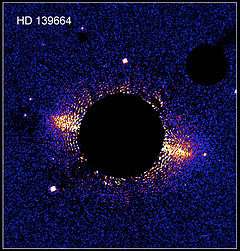HD 139664
| Observation data Epoch J2000.0 Equinox J2000.0 (ICRS) | |
|---|---|
| Constellation | Lupus |
| Right ascension | 15h 41m 11.3774s[1] |
| Declination | −44° 39′ 40.338″[1] |
| Apparent magnitude (V) | 4.64[1] |
| Characteristics | |
| Spectral type | F5V[1] |
| U−B color index | −0.03[2] |
| B−V color index | +0.40[2] |
| R−I color index | +0.20[2] |
| Astrometry | |
| Radial velocity (Rv) | −5.4 ± 2[1] km/s |
| Proper motion (μ) | RA: −168.70[1] mas/yr Dec.: −265.69[1] mas/yr |
| Parallax (π) | 57.09 ± 0.72[1] mas |
| Distance | 57.1 ± 0.7 ly (17.5 ± 0.2 pc) |
| Absolute magnitude (MV) | 3.42[3] |
| Details | |
| Mass | 1.29+0.05 −0.04[4] M☉ |
| Radius | 0.91[5] R☉ |
| Temperature | 6600[4] K |
| Metallicity [Fe/H] | −0.11[4] dex |
| Rotational velocity (v sin i) | 87[2] km/s |
| Age | 1.3+0.7 −0.8[4] Gyr |
| Other designations | |
| Database references | |
| SIMBAD | data |
HD 139664 is an F-type main-sequence star in the constellation of Lupus.[1] It has an apparent visual magnitude of approximately 4.64.[1] A debris disk has been imaged around this star using the coronagraphic mode of the ACS instrument on the Hubble Space Telescope. The disk appears to have a dust maximum at 83 AU from the star and a sharp outer boundary at 109 AU. These features may be caused by gravitational perturbations from planets orbiting the star.[6]
References
- 1 2 3 4 5 6 7 8 9 10 11 LTT 6256 -- High proper-motion Star, database entry, SIMBAD. Accessed on line February 4, 2011.
- 1 2 3 4 HR 5825, database entry, The Bright Star Catalogue, 5th Revised Ed. (Preliminary Version), D. Hoffleit and W. H. Warren, Jr., CDS ID V/50. Accessed on line February 4, 2011.
- ↑ From apparent magnitude and parallax.
- 1 2 3 4 HD 139664, database entry, The Geneva-Copenhagen Survey of Solar neighbourhood, J. Holmberg et al., 2007, CDS ID V/117A. Accessed on line February 4, 2011.
- ↑ HD 139664, database entry, Catalog of Apparent Diameters and Absolute Radii of Stars (CADARS), 3rd edition, L. E. Pasinetti-Fracassini, L. Pastori, S. Covino, and A. Pozzi, CDS ID II/224. Accessed on line February 4, 2011.
- ↑ First Scattered Light Images of Debris Disks around HD 53143 and HD 139664, Paul Kalas et al., The Astrophysical Journal 637, #1 (January 2006), pp. L57-L60, doi:10.1086/500305, Bibcode: 2006ApJ...637L..57K.
This article is issued from Wikipedia - version of the 10/30/2016. The text is available under the Creative Commons Attribution/Share Alike but additional terms may apply for the media files.
